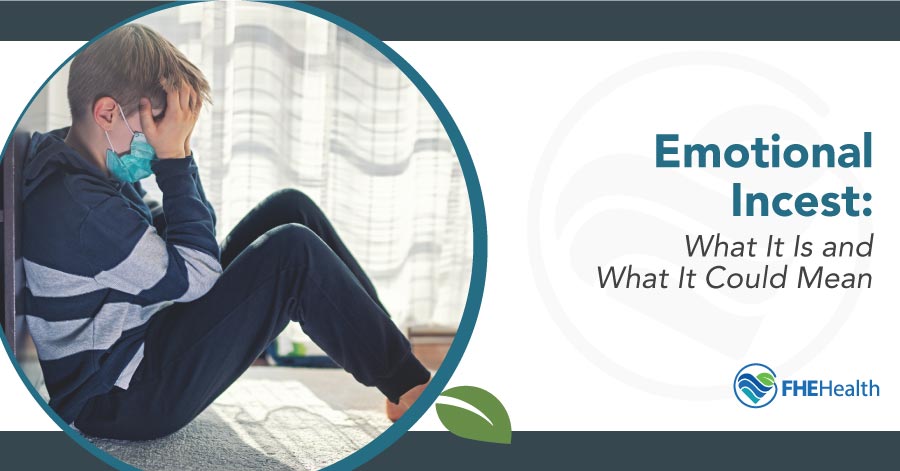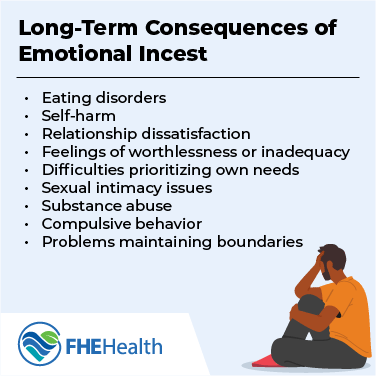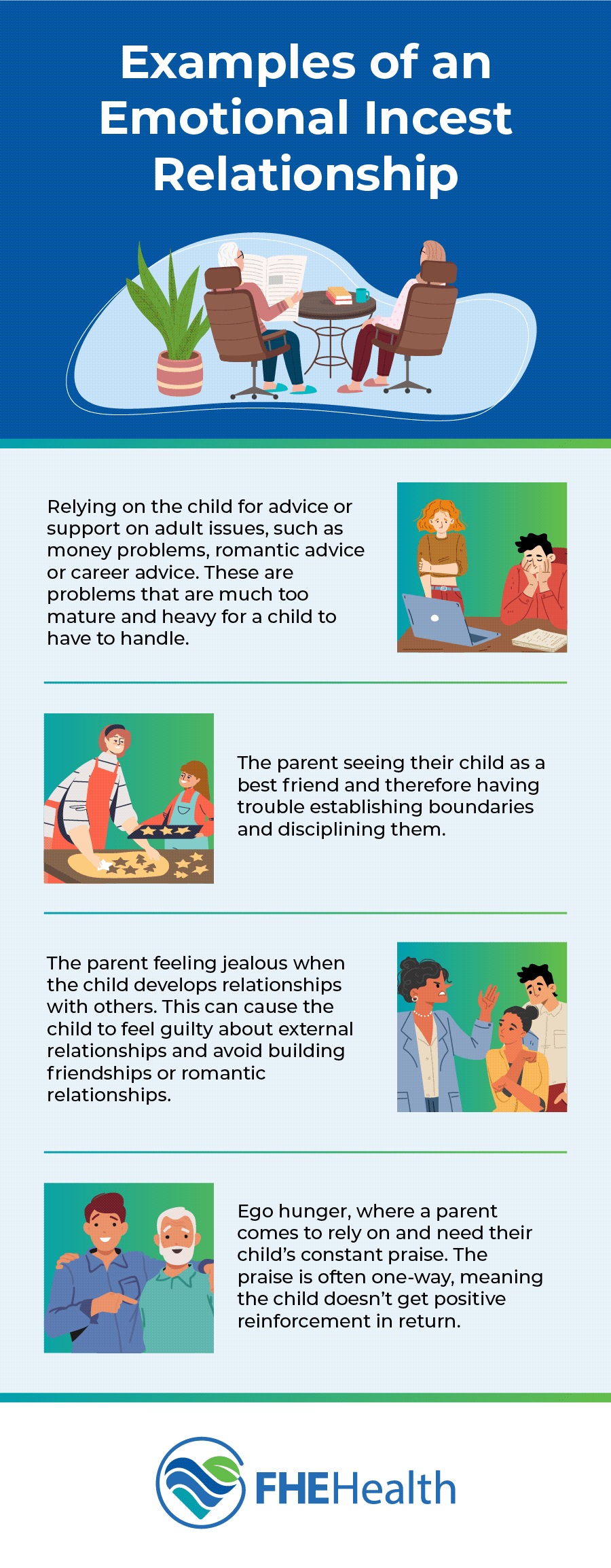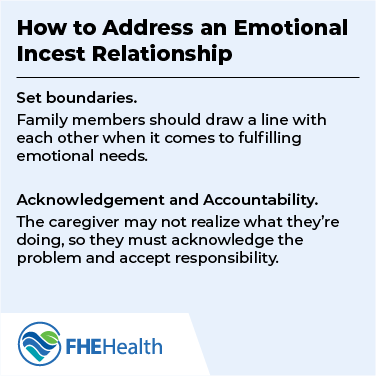
It’s natural for people to lean on their family members for support. However, when a family is under a lot of stress, this tendency to lean can turn unhealthy. Stressed family units can quickly progress into situations where a child is relied on too much for emotional support. This is known as “emotional incest” and has potentially negative consequences for everyone involved.
What Is Emotional Incest?
The phrase “emotional incest” can be a bit misleading. but it refers to a boundary violation in familial relationships where a parent relies on a child for emotional support beyond age-appropriate levels. This maladaptive dynamic can lead to an unhealthy enmeshment where the child takes on the role of a surrogate partner. It may hinder the child’s emotional development and create challenges in forming healthy relationships. Addressing emotional incest involves establishing clear boundaries and seeking professional support for both the parent and child to foster healthier connections.
The American Psychological Association defines covert incest as a form of emotional abuse. The adult is prioritizing their needs over the child’s at the expense of the child’s mental well-being. “Covert” refers to the fact that this type of abuse is often much more challenging to catch outside the household. It’s a less visible form of abuse than sexual or physical abuse, which is more likely to be discovered by teachers or family friends. In fact, a child who’s gone through emotional incest may not even realize their experience of abuse until later in their adult life.
Examples of an Emotional Incest Relationship
 A covert incest relationship can take many forms, including:
A covert incest relationship can take many forms, including:
- Relying on the child for advice or support on adult issues, such as money problems, romantic advice or career advice. These are problems that are much too mature and heavy for a child to have to handle.
- The parent seeing their child as a best friend and, therefore, having trouble establishing boundaries and disciplining them.
- The parent feeling jealous when the child develops relationships with others. This can cause the child to feel guilty about external relationships and avoid building friendships or romantic relationships.
- Ego hunger, where a parent comes to rely on and need their child’s constant praise. The praise can be sought in a public or private setting. When a parent has an ego hunger problem, the praise is often one-way, meaning the child doesn’t get positive reinforcement in return. If allowed to continue, the child’s needs and confidence take a back seat to their parent’s narcissistic tendency.
Does Emotional Incest Rise to Child Abuse?
In some forms, emotional incest rises to the level of child abuse. The “textbook” emotional incest definition considers this dynamic child abuse when a parent consistently places inappropriate emotional burdens on a child, relying on them for adult-level emotional support and companionship, impeding the child’s emotional development and leading to potential long-term consequences. Identifying this behavior involves recognizing patterns of enmeshment, where a parent crosses the line in seeking emotional fulfillment from the child. Professional intervention and support are crucial to address and rectify such situations.
Being close to a parent isn’t considered emotional incest. True emotional incest is inappropriate and never considered acceptable or healthy. Healthy parent-child relationships involve appropriate boundaries, with adults seeking emotional support from peers or professionals.
Potential Long-Term Consequences of an Emotional Incest Relationship
Covert emotional abuse can have long-term consequences for a child. Both the caretaker and the child are often unaware of the problematic dynamic of their relationship until much later. From the child’s perspective, they may feel special because their parent treats them like a grown-up. And for the parent, covert incest typically happens without an awareness of the potential impact on the child.
Children with emotional incest syndrome are at a higher risk of:
- Eating disorders
- Self-harm
- Relationship dissatisfaction
- Feelings of worthlessness or inadequacy
- Difficulties prioritizing their needs because they become so used to caring for another
- Sexual intimacy issues
- Substance abuse
- Compulsive behavior
- Problems maintaining boundaries with people
Individuals may begin to experience these problems during their childhood. However, for some, these effects of emotional incest may arise later on in adulthood.
Additionally, emotional incest can cause severe issues within the family dynamic. The child may struggle with a love-hate relationship with their parent, both in childhood and later in life. They’re naturally very close with this parent but also come to understand the damage the parent has done to them.
Lastly, the child can become angry at other parental figures. If the emotional incest started due to divorce, the child may fault the divorce and blame both parents. If the other parent is still in the household, the child can blame them for witnessing the covert incest and not stepping in to stop it.
How to Address an Emotional Incest Relationship
If you’re currently experiencing or witnessing emotional incest, you must set boundaries. Family members should draw a line with each other when it comes to fulfilling emotional needs. Addressing the fact that covert incest is happening is the first step. The caregiver may not realize what they’re doing, so they must acknowledge the problem and accept responsibility.
Healing From an Emotional Incest Relationship
Both the parent and the child will need to heal from an emotional incest relationship. The parent should seek therapy so they can get help establishing and respecting boundaries with their children. They’ll also have to find a new, healthy resource for emotional support, such as a friend.
Children will also need to work on healing from covert incest abuse. Many children who’ve gone through this experience move far from the parent in an attempt to get away as an adult. However, this isn’t a long-term solution as the parent can still reach out and break boundaries with phone calls, visits, emails, texts and other means of contact.
The child will have to make their boundaries clear. This will likely be challenging, but therapy can be a great asset in the healing journey. Therapy is also necessary as the child is at a higher risk for experiencing some mental health problems. If the child is diagnosed with a mental health disorder, such as anxiety or depression, medication and treatment might be necessary.
Some people find it comforting to attend support groups with people who’ve been in similar situations. A person who’s been through emotional incest can find support groups for childhood abuse, codependency and enmeshment.
Ideally, both the parent and the child will need to accept what happened, set and stick to boundaries and try to make amends.
Coping With Emotional Incest
Parents may not realize an emotionally incestuous relationship has been formed with their child. Coping with emotional incest and its impact on individuals involves recognizing the issue, setting clear boundaries and seeking support. Professional therapy provides a safe space to explore and address the emotional impact of covert incest, establish boundaries and focus on learning to build healthy familial and nonfamilial relationships, disengaging from inappropriate emotional demands and desires. Caring professionals at FHE help parents and their children understand the definition of emotional incest, recognize signs of emotional incest, overcome this destructive relationship dynamic and see a clearer, healthier path forward.
FHE Health Can Help
FHE Health can help if you’re looking for counseling or support to deal with an emotional incest relationship. Seeking professional support can help patients learn the dynamics of a healthy relationship, better understand boundaries and address any outstanding mental health consequences of the emotional incest head-on. Our mental health rehab programs are the solution you’re looking for. Contact us today to get in touch with a counselor 24-7.








